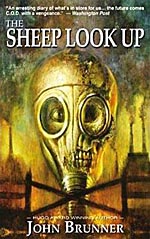
![]() gallyangel
gallyangel
12/26/2016
![]()
"The function of science fiction is not always to predict the future but sometimes to prevent it." - Frank Herbert
This, I think, fits Brunner's The Sheep Look Up very well.
First published in 1972, The Sheep Look Up takes the major concerns of the late 60ies and early 70ies - the nascent environmental movement, the scorn heaped on that movement, pesticide use, unwavering faith in pharmaceuticals, the draft, militarization, the unswerving rightness of U.S. foreign policy, racial inequality, woman's lib, intellectual "scientific" dishonesty (and the removal of materials which are public record but show the pattern of that intellectual dishonesty), and pushes those trends forward 30 years to the end of the 20th century.
In other words, the world of The Sheep Look Up is a pit. It's something to be avoided, or, as Herbert said: prevented. Since we're now over 40 years removed from the writing of the novel, there is an obvious time capsule aspect which was not present upon completion. We can now look back at how we did with that whole host of issues. We can contemplate the why question: why didn't it turn out like that? How did those obvious trends change sufficiently enough so we didn't end up in the hell that is The Sheep Look Up?
This novel is a signpost in the history of SF. We were here; this was going on; this was what we were worried about. Since the novel is distopic, enjoyment is not the word I'd use to describe my reaction to reading it. But useful, instructive, and valuable as a SF signpost, sums up my reaction to the book. I think this novel will endure a while yet because of that signpost aspect. And if we could trace out how The Sheep Look Up helped derail the very trends it uses, that would be a major coup for the power of SF to prevent an undesirable future.